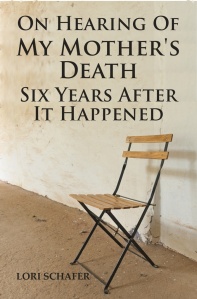It is my honor to host Lori Schafer today. Her memoir, On Hearing of My Mother’s Death Six Years After It Happened, is being released today. I was fortunate enough to receive an advanced copy and will be posting a review next week. Lori writes about a subject close to my heart – the effect of mental illness of the family. My extended family has been touched by several different forms of mental illness so I appreciate the struggles that Lori endured. Well, without any further delay, here is Lori Schafer.
Thank You: An Open Letter to Those Who Stood By Me During My Mom’s Mental Illness
Dear Friends from My Youth,
Next June will mark the twenty-fifth year since our graduation – the twenty-fifth anniversary of the day I left home.
Some of you I have not seen in those twenty-five years. Some, I fear, I won’t see again. I’ve never been one for reunions or for keeping in touch, yet you might be surprised at how often I think of you still. Lately my memories of you have drawn even nearer to the forefront of my mind, as I think back on the day that I ran away – as I think back on all the other days when I wished that I had.
In the spring of last year, I learned that my mother had died, six years before, in 2007. In the months that have passed since, I’ve written a book: On Hearing of My Mother’s Death Six Years After It Happened: A Daughter’s Memoir of Mental Illness.
I know that to you I don’t need to explain; that I don’t need to tell you why I say mental illness, and that you’ll understand fully why it took so long for me to hear of her death. And perhaps you’ll understand, too, why I think of you now more than I have in two decades; why I’m writing this letter years after you should have received it.
We were all of us helpless during Mom’s mental illness, adolescents with limited experience and limited resources. There was little we could do to manage my personal situation, and nothing we could have done to manage my mother’s psychosis. Yet each of you did something, some small thing, perhaps, to ease my distress and lessen my pain. Each of you, in your own small way, helped me escape, helped me move on, helped me survive.
So to you, Maria, my long-time chum, I want to say thank you. For letting me call you at midnight when I got too lonely to stand it; for letting me talk and also letting me listen. For persuading your parents to permit me to use your phone number on my college applications, so that Mom didn’t have to know everywhere I’d applied. Maybe it didn’t seem like much to have done to help out a friend. But it got me my scholarship, and that salvaged my life.
To you, Karina, let me also say thank you. For helping me plan and then helping me move; for corralling our dog back into the house while I was frantically packing, for knowing that even in that desperate hour I wouldn’t have wanted him to get hurt or get hit. For being my friend in spite of what anyone thought; for never giving a damn what anyone thought. For that, Karina, I thank you.
George, my former friend, my later lover, how can I thank you? You did so little, and yet so very much. You came when I called. You’ve always come when I called. I think you still would.
Josh, my old friend Josh. What a wonderful time we had while Mom was insane! For so long you were my sole solace, my sole support, my sole source of happiness. I’ll never understand why Mom, even in the depths of her dementia, took such a shine to you and your charms; why her suspicions never turned upon you as they did the rest of our friends. You were the only person, kid or adult, that she would still allow into our house, and what a dreary, depressing place it must have been for a cheerful and energetic young man to enter time and again. Yet you did. Week after week and day after day, you came and kept me company, kept me alive, kept me sane. You perhaps can’t imagine how much I looked forward to your visits, or how often I’ve wondered what impelled you to make them. Or how hard it hit me when they finally came to an end, when even your most good-natured arrows could no longer pierce my mother’s thick armor. Yet the light of your smile, that you shone upon me and that you even shone upon her, lightened my burden and smoothed my transition. Those afternoons that we spent side by side were the most precious gift I had ever received. I thank you for giving them to me. I will never forget them.
Jesse, sweet Jesse. Quiet and shy, lacking, like me, even a license, you weren’t well-prepared to swoop in like a knight and come to my rescue. No, you weren’t able to take me away – but you never went away, either. You continued to love when there was no reason to love; you continued to wait when the waiting seemed without end. You were there when I emerged, blinking hard against the sun now burning my eyes, and you were there when I sank again into black pits of despair. There were times when I couldn’t have counted the days since I last saw you – and there were more when I didn’t want to count those that would pass before I saw you again. But I knew that however many had passed, and however many more would, you would still be waiting, and that was everything to me. Thank you, Jesse. Thank you for being with me.
And thank you, friends, for listening and for reading my letter. I know that we may never again meet, and may never again speak. I know that you’ll understand why I haven’t written you sooner, and why I won’t ever write you again. And I know, too, that you’ll forgive me for so long maintaining my silence. Because what’s a mere twenty-five years between friends?
Forever yours,
Lori
On Hearing of My Mother’s Death Six Years After It Happened: A Daughter’s Memoir of Mental Illness
It was the spring of 1989. I was sixteen years old, a junior in high school and an honors student. I had what every teenager wants: a stable family, a nice home in the suburbs, a great group of friends, big plans for my future, and no reason to believe that any of that would ever change.
Then came my mother’s psychosis.
I experienced first-hand the terror of watching someone I loved transform into a monster, the terror of discovering that I was to be her primary victim. For years I’ve lived with the sadness of knowing that she, too, was a helpless victim – a victim of a terrible disease that consumed and destroyed the strong and caring woman I had once called Mom.
My mother’s illness took everything. My family, my home, my friends, my future. A year and a half later I would be living alone on the street on the other side of the country, wondering whether I could even survive on my own.
But I did. That was how my mother – my real mother – raised me. To survive.
She, too, was a survivor. It wasn’t until last year that I learned that she had died – in 2007. No one will ever know her side of the story now. But perhaps, at last, it’s time for me to tell mine.
On Hearing of My Mother’s Death Six Years After It Happened is now available in eBook and paperback from Amazon. The audiobook, which Lori narrated, is also forthcoming.
 Author Bio
Author Bio
Lori Schafer’s flash fiction, short stories, and essays have appeared in numerous print and online publications, and her first two books were published this November. On Hearing of My Mother’s Death Six Years After It Happened: A Daughter’s Memoir of Mental Illness commemorates Lori’s terrifying adolescent experience of her mother’s psychosis, while Stories from My Memory-Shelf: Fiction and Essays from My Past is an autobiographical collection featuring stories and essays inspired by other events from Lori’s own life. In the summer of 2014, Lori began work on a second memoir, The Long Road Home, during the course of a solo two-month-long journey across the United States and Canada. She anticipates that it will be ready for publication late in 2015.
When she isn’t writing (which isn’t often), Lori enjoys playing ice hockey, attending beer festivals, and spending long afternoons reading at the beach in the sunshine. For further information on Lori’s upcoming projects, please visit her website at http://lorilschafer.com/.


It’s the little things that people do that help in unbearable situations. Emotional abuse is so devastating. So glad Lori is telling her story. Thank you Elizabeth for sharing this post.
Thanks for reading, LaTanya – and thanks for the reblog! 🙂
Reblogged this on Memoir Notes.
I’ve downloaded the book for my kindle and will look forward to reading it. Thank you, Elizabeth, for sharing this guest post with Lori Shafer.
Thank you very much! I hope you enjoy it! 🙂
Reblogged this on Lori Schafer's Short Subjects I Feel Like Writing About and commented:
Thanks for having me, Elizabeth!
Thank you, Elizabeth, for this guest post with Lori. I look forward to reading this incredible story of survival. Mental illness touches so many families–it’s easy to miss those on the sidelines whose lives will be impacted forever. I’m so glad Lori is telling her story!
I have the book and I will be reading and reviewing. Lovely to see this guest post.
What a wonderful thank you letter, Lori! I left home at eighteen for similar reasons. Congratulations on the release of your book!
Thanks, Jan! I’m both sorry and glad that someone else knows the feeling. I guess the main thing is, we both made it. And that’s something to cheer about 🙂
Congrats Lori on the book release and for your courage. 🙂
Thank you very much – I appreciate your support! 🙂
What deep emotions are expressed in your letter. What wonderful sentiments. So pleased your friends were there to love and support you, Lori. 🙂 Thanks too to Elizabeth for posting.
Funny, because at the time I don’t think I had the proper sense of appreciation – I was too overwhelmed by everything else that was going on. But now I see what a difference those small acts of kindness made in my world – and the one that would follow it. 🙂
I think that is all so understandable. 🙂
A touching letter Lori, I’m so glad that you had such good friends to lean on, during what was clearly an incredibly difficult time in your life.
Lovely post, Thanks for sharing
Take care, Kimmie x
Thanks, Kimmie! I appreciate your support 🙂